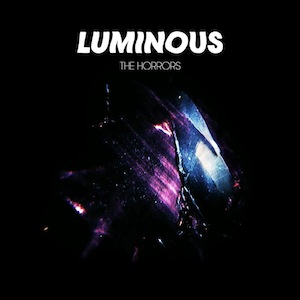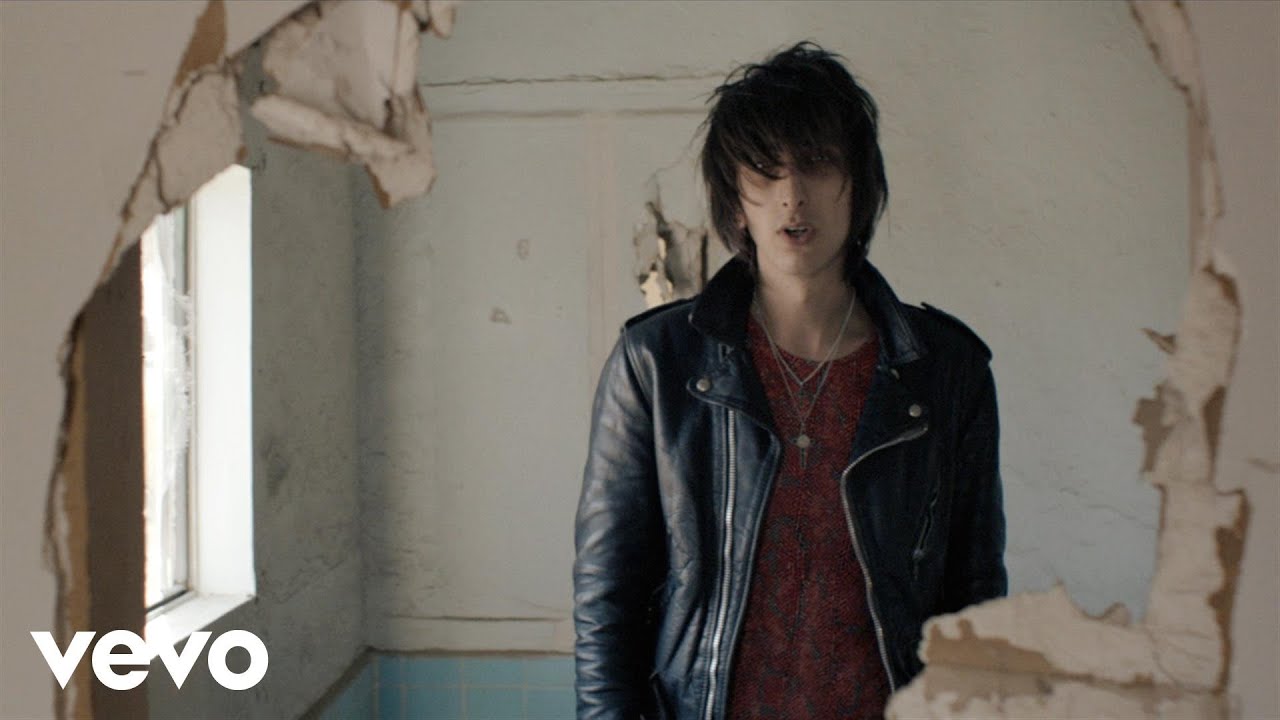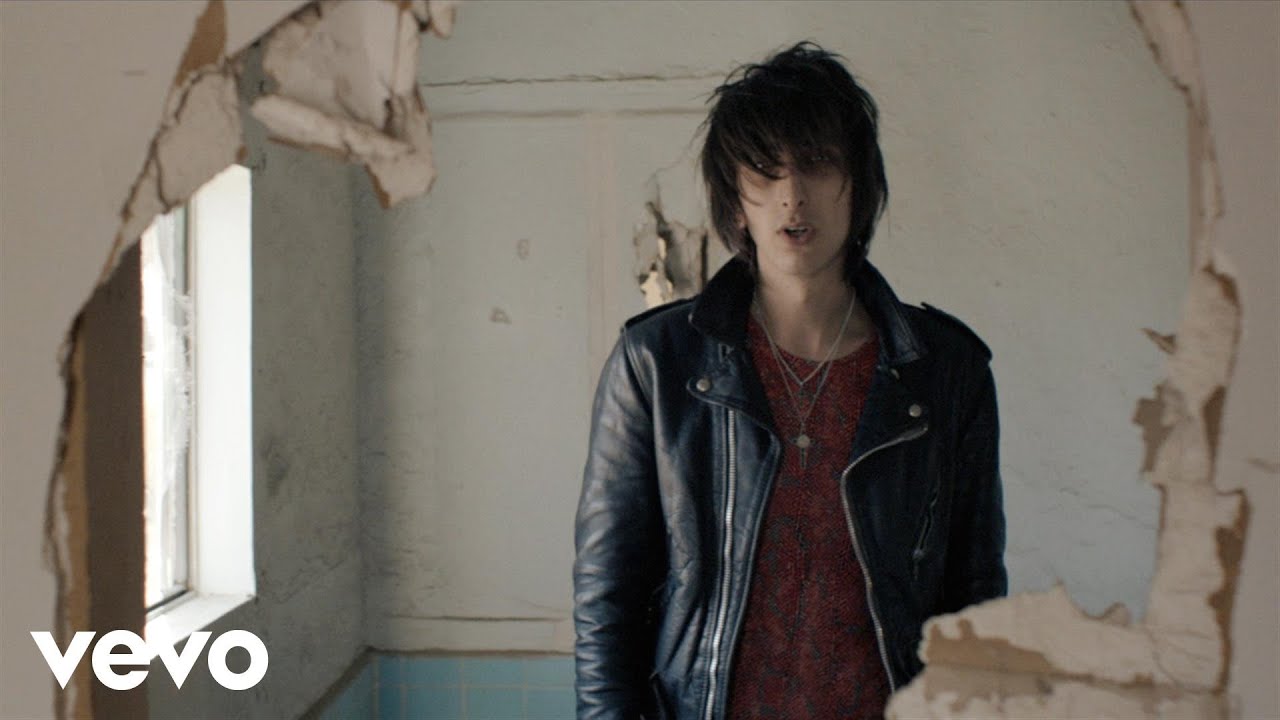Maybe we got the wrong idea about the Horrors, and consequently the wrong expectations. When they made that huge stylistic leap from the gothic retro-garage clatter of Strange House (a brilliant album in its own way) to the moody, motorik psych pop of Primary Colours, we thought that they were going to change musical direction as dramatically with every album. That, and the fact that they had a strong visual image that also changed accordingly, led us to think that maybe we had an indie boyband equivalent of Prince or Bowie on our hands; an act that would reflect the zeitgeist, stay one step ahead of the times, and dictate our haircuts and the cut of our trousers with each new record and photo shoot.
Music and fashion don’t work that way anymore though, and 2011’s Skying merely developed and extended the ideas announced on Primary Colours. There were to be no more grand reinventions of the template and, despite the three-year wait, Luminous continues this trend. The synthesisers are more to the fore, and there is noticeably more influence from electronic and dance music, but the Horrors, it turns out, are closer to a band like The Cure, who also released one album of spiky punk-pop before finding their true furrow- bleakly minimalist suburban psychedelia- and pursued it doggedly ever after, to great effect.
The other expectation we wrongly had of the Horrors was that every album should contain a game-changing standout track like Strange Colours’ ‘Sea Within A Sea’ – their ‘A Forest,’ if you will. There’s nothing as immediately stunning on Luminous, or even an instant, crowd-pleasing epic comparable to Skying’s ‘Moving Further Away’. But that’s no reason to dismiss this album as the Horrors treading water. The choruses and the hooks are all there, they’re just a bit less obvious, a bit more diffuse. Luminous is a great record, but it’s an awkward bugger at times, and I suspect that in the long run the album will prove all the more rewarding for just that reason.
It starts, for instance, with nearly three minutes of burbling electronic atmospherics, like Tangerine Dream with a couple of crusty free festival bongo players, before ‘Chasing Shadows’ really kicks in. But when it hits, it really hits, and you know this song was written to open their live sets because it immediately sounds just like The Horrors, and it’s wonderful, and it’s wonderful to have them back. For all their much-noted magpie tendencies, Faris and company really have developed a distinctive sound that’s uniquely, recognisably theirs. Sparkly synth runs trill over bowel-shifting distorted guitars and what might be called "baggy" drums – although it should be noted, as an aside, that when they popularised this beat The Stone Roses and the Happy Mondays were listening to Can, Hendrix, James Brown and 80s hip hop and absorbing and distilling them all, and that it took the wit and wisdom of Music Journalists, who pride themselves on knowing far more about the history of music than the bands they write about, to reduce this unprecedented awareness of groove in white indie guitar music down to the lowest common denominator term "baggy."
Anyway, it’s typical Horrors pick and mix pop, drawing from the golden era of British independent music- roughly 1977 to 1993, a kind of extended 80s, but leaning towards the more recent end of the spectrum. So there’s a whole lot of shoegaze, a big dollop of new romantic synth pop, a fair whack of gothic gloom, a pinch of post-punk spikiness and some Smiths-Suede swoon and introspection. If they touch on the psychedelic 60s it’s through C86-tinted glasses, and always closer to Wire or the Teardrop Explodes than Pink Floyd or Tomorrow. And somehow they’ve mixed this stew of influences into something original and distinctive that couldn’t have been made in any time prior to the past ten years.
That said, there is something of a psychedelic swirl on ‘First Day Of Spring’, but it’s also brilliant, leftfield weird pop music, of the kind that really came to the fore in the early 80s. As Faris Badwan croons feyly it reminds me somehow of The Associates, without in any way being a direct copy. Two-thirds of the way through the song opens out into a runway of single-minded bass and glistening, propulsive synths, and for some reason there’s an immense thrill in hearing the squeak of fingers sliding up a guitar neck at four minutes fourteen seconds in, and the handclaps, artificial or not, throughout. Next, ‘So Now You Know’ has the wide-eyed, open sky European pulse of Kraftwerk via early Simple Minds, though it’s lyrically vague and opaque to the point where it’s either blandly meaningless or open and universal: "So now you know, turn away." The difference, I guess, is merely whatever baggage the listener brings to the song. Meanwhile, digitally distorted guitars howl through the spaces between the synths and the beats, like the cold contaminated wind through the ruined struts of former Soviet listening stations.
‘In And Out of Sight’ could be a perfect pop song – specifically it could be ‘Thieves Like Us’ by New Order. The shimmering, stolen synth riff chimes with a disco pulse on the off-beat, the call and response vocals like the theme from an imaginary John Hughes movie. But just as you’re expecting the big chorus to hit it all goes passive, drifting, psychedelic; lost in a drug haze, too stoned to get up out of the beanbag and consummate the deal. Alright, I’ll make my own cup of tea then, you think, and realise at this moment that Luminous isn’t going to do all the work for you. There are no killer punches, there’s no passionate (perfect) kiss. Instead there’s an ambiguity, an ambivalence that is ultimately more fascinating and worthwhile.
I’m convinced it’s not a fault; that it’s deliberate. The Horrors do great pop just enough to show that they can do great pop, and then they immediately twist away into murkier waters. Like, we could do that, and we will for a bit, but really we’re going to do this, not because we can’t do that, because we can, and that is fine, but this is what we’re really interested in, because that, if we really pursued that, is ultimately just manipulative and formulaic, whereas this… well, we’re not really sure what this is, which is kind of the point.
So ‘Jealous Sun’: queasy shoegaze guitars and slow, pounding, Teutonic beats. It reminds me of when I used to stay up all night on speed and acid and then go to sign on, and how paradoxically speed can make everything seem really slow-moving, and you feel like you’re ten feet tall but only an inch wide and your cheekbones could sculpt skyscrapers from ice and you haven’t slept and everything is starting to blur around the edges and keeps going out of focus and you sway in the slight breeze and could topple over at any moment and your wasted life yawns in front of you like an abyss but still you’re on top of the world, right?
"Your empty promise is just a word on a wing," Faris sings on ‘Falling Star’, and there’s something of Station to Station era Bowie here, something of Idiot Iggy even, but it’s pop music, soul music almost – it’s joyous cocaine disco with a buzzing, queasy undertow. I think of The Associates again; I even think of Kylie, or maybe the portrait Kylie keeps in the attic, with all of the sin and excess showing on her ravaged, still-smiling features. And that hammering coda, blocks of light crashing to the ground all around you like how can it be morning already?
Oddly, the first track to be released from the album, ‘I See You’ is not by any means the strongest, though it starts remarkably well – a Giorgio Moroder groove and Bunnymen guitars – but then it has a weak chorus that’s Horrors-by-numbers, and a too-long, wooshy outro that sounds like boring filler on record but will probably sound amazing live, or at the right moment in the right club on the right drugs at some point in the summer. Right now, I prefer ‘Change Your Mind,’ which is almost an old-fashioned 1950s ballad, made curiously contemporary by Faris’s out-of-tune singing. All tremolo guitars and retro-modern whistling electronics, it’s like Joe Meek’s 99th Dream, and is the kind of nakedly jealous, pleading love song that could break your heart if the cracks were already showing: "You know it only takes one of us, you know you won’t say…"
And then finally, the ‘Kashmir’ drums and portentous bass synth on ‘Sleepwalk’ set us up for a big finish that- of course- never really comes. The Horrors once more either follow their own more interesting whims, or cop out, depending on your point of view. As you know by now, I lean towards the former opinion.
Luminous could be described, perhaps pretentiously, as an exercise in pop and then the negation of pop: they set it all out, and then they go somewhere else instead. "Now you know; turn away." See, that line’s starting to mean something already.




